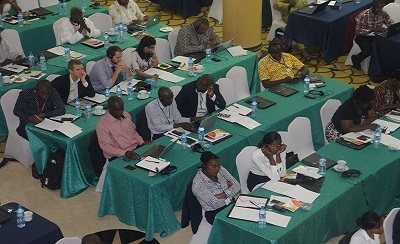
The 4th Pan African Conference on Curbing Illicit Financial Flows and Taxation just concluded with key conclusions and recommendations. The two day conference, under the theme “Curbing IFFs to promote Africa’s Structural Transformation” that held at Abuja from October 11 – 12, 2016 was organized by the Tax Justice Network - Africa (TJN-A) together with the United Nations Economic Commission for Africa, the Tax Justice and Governance Platform – Nigeria under the umbrella body of Civil Society Legislative Advocacy Centre (CISLAC), with funding support from the Friedrich-Ebert-Stiftung, provided a platform for key stakeholders to articulate IFFs issues from an African perspective within the context of Africa’s structural transformation. The meeting was declared opened by Mr. Adam Elhiraika, Director, Macroeconomic Policy Division, the representative of the UNECA Executive Secretary.
Major discussions and presentations took a look at the current state of Illicit Financial Flows on the continent as well as recommendations in tackling IFFs through global, regional and country level initiatives. One key issue that cropped up was that tax incentives don’t work and are bad for the Continent. Although taxation is the most important source of revenue that enables governments to finance development and provide services required by citizens, Illicit Financial Flows (IFFs) has continued to yield devastating effects on African economies by hampering governments’ developmental efforts.
Another issue was on how tax treaties or agreements pave way for dreadful corporate tax incentives, which are fiscal provisions offered to investors. As highlighted by a presentation by West Africa Administration Forum, corporate tax incentives include reduced tax rate or ‘full holiday’, whereby companies pay no taxes for certain time periods. These incentives permit companies to pay less tax on their profit than normal, or benefit from reduced or no tax on services such as water, electricity or land.
While employment creation is a motivation for West African governments to promote corporate tax incentives, most of West African countries are doing poorly in terms of employment creation. For instance, TJN-A reported that in Nigeria, employment among firms receiving incentives stood at about 7,000 in 2013 from 30 million youths seeking employment. While over 80% of foreign direct investment in Nigeria is in oil, the sector employs less than 2% of the Nigerian workforce. Experts at the conference also bemoaned the activities of development finance institutions which support multinational companies’ illicit efforts using the world’s most secretive financial centres. Conference raised concern over the ongoing support to companies using tax havens, poor accessibility of tax haven standards, and questionable due diligence and poor portfolio transparency.
At the 2-day conference, solutions were proposed on curbing Illicit Financial Flows against the backdrop of Africa’s structural transformation. It is imperative for African governments to eliminate corporate income tax holidays; embark on public review of all corporate tax incentives, and ensuring incentives are commensurate with the expectation of citizens; subject all phase of new incentives to legislative approval; refrain from entering into stability clauses when negotiating new corporate tax incentives and investment agreements; develop appropriate mechanisms for adequate oversight of corporate tax incentives; develop double tax treaty policy framework and a model treaty to define what policy outcomes are most beneficial to Africa; adopt and effectively implement Thabo Mbeki’s Panel recommendations on IFFs; mandate DFIs to take an active role in promoting responsible tax practice and policy and more effectively safeguard against harmful tax practices.
African governments are further urged to actively participate in the worldwide movement towards the automatic exchange of tax information as endorsed by OECD and the G20; treat trade transactions involving tax haven jurisdictions with the highest level of scrutiny by customs, tax and law enforcement officials; and strongly enforce all anti-money laundering regulations.
The conference opened up space to strategize and map a way forward with regard to implementing the recommendations of the High Level Panel on Illicit Financial Flows from Africa. The conference brought together key stakeholders from civil society, legislators, media, academia and national campaigners.





